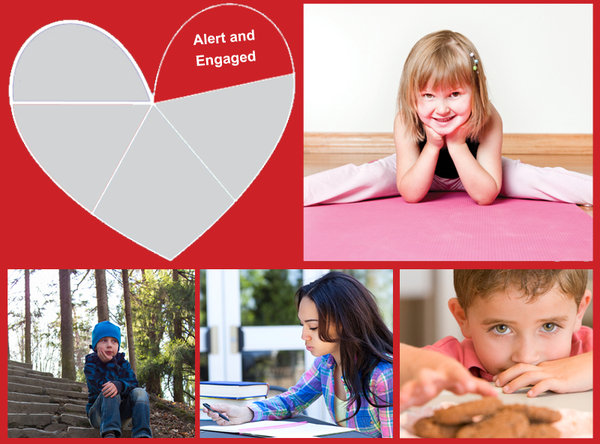Heart-Mind Challenge: Alert and Engaged


What is the quality "Alert and Engaged"?
Children who are alert and engaged are able to manage and direct their own feelings, thoughts and emotions. In general, they are able to be ‘present’ and to demonstrate self control. Being alert and engaged involves the ability to manage your attention and to hold yourself back, especially when you don’t want to.
When scholars and researchers look at this quality they often view it through the lens of self-regulation. Self-regulation is defined as the ability to manage your own energy states (hyper energy, high energy, low energy), emotions, behaviours and attention, in ways that are socially acceptable and help achieve positive goals, such as maintaining good relationships, achieving and maintaining well-being .
Regulating emotions and behaviours is part of everyday life. It is a skill and ability that children develop over time. How it develops in each child is different depending on their temperament, and on the quality of their interactions with family members, especially throughout the first years of life. Self-regulation improves significantly during the preschool years, getting children ready to attend school and to learn in the classroom setting.
What does that quality look like?
Some of the things young children who are alert and engaged are usually able to do:
What does it look like when that quality is diminished?
Typical behaviour patterns include difficulty with settling down and a hard time in taking turns. A young child might have a tendency towards temper tantrums. They might demonstrate impulsiveness and a tendency to have difficulty following rules. Often they can be easily distractible. These all depend on the age of the child, their developmental stage and their temperament.
Why is it helpful/useful to have that quality?
Successful self-regulation in preschool age children is an indicator of healthy emotional development, and it is a critical foundation for children’s present and future social and emotional development, and academic success. Indeed, teachers and researchers have named self-regulation as the most important aspect for being ready to attend school.
Remember - prevention is ALWAYS the best way to promote the quality of alert and engaged. Prevent stress in adults and children with the basics – healthy food, adequate sleep, as well as relationships full of love, attention, listening and respect
Pick an action (or two or six) for the week. Be aware of your own abilities to manage your emotions and support the children in your life to do the same.
![]() Play “Let’s pretend…”
Play “Let’s pretend…”
Make-believe play with adults involved serves as an opportunity for adults to role model self-regulation skills, such as verbalizing strategies to deal with emotions and behaviours that show good self-regulation.
Have a tea party, be a racecar driver, battle pirates on the open sea… Inspire your child to come up with scenarios with an offer of dress up clothes, simple scarves, stuffed animals or blocks. Read this article for the “how-to’s” to set up an environment for young children that fosters learning opportunities rich in make-believe play.
![]() Learn about self regulation along with Cookie Monster.
Learn about self regulation along with Cookie Monster.
Self-regulation is about individuals having the ability to stay calmly focused and alert. The better a child can stay calmly focused and alert, the better he or she integrates all the diverse information coming in from his different senses, assimilates it, and sequences his thoughts and actions. Follow Cookie Monster as he learns to cope with delayed gratification, regulating his different emotions and “control his urge” to eat cookies!!
Cookie Monster Learns to Self-Regulate So Kids Can Too
![]() Be a part of Self-regulation efforts in Canadian schools.
Be a part of Self-regulation efforts in Canadian schools.
If self-regulation has caught your interest, Canadians can be proud of Dr. Stuart Shanker and the Canadian Self Regulation Initiative. A host of excellent evidence-informed information on the topic and updates on BC School districts who have made a commitment to support self-regulation efforts in schools.
Follow the links to hear a CBC radio interview with Dr. Stuart Shanker (the "brain doctor") and to check out what the Canadian Self Regulation Initiative is up to.
![]() There is nothing like a story to engage the heart and still the mind.
There is nothing like a story to engage the heart and still the mind.
Reading books together gives you a great opportunity to talk about and identify emotions. Pause along the way and encourage the child to predict the characters’ emotions and to discuss the vocabulary and any connections the students have. Ask the child to share any connections they may have about a time when they felt frustrated, embarrassed, excited, etc.
Orange, Pear, Apple, Bear, by Emily Gravett
Sitting Still Like A Frog, by Eline Snel
Take the Time: Mindfulness for Kids, by Maud Roegiers
I Am Really, Really Concentrating, by Lauren Child
CHAPTER BOOKS
When You Reach Me, by Rebecca Stead
Joey Pigza Swallowed the Key, by Jack Gantos
The Middle of Somewhere, by J.B. Cheaney
The Conch Bearer, by Chitra Banerjee Divakaruni
Challenge book recommendations from a Children’s Librarian, Vancouver Regional Library.
![]() Yoga in the classroom.
Yoga in the classroom.
Yoga is a practice that cultivates self-regulation and enhances a child’s ability to remain alert and engaged. Introducing yoga to children and youth can happen at home, in child care and in any grade level during the school years.
Here are a few resources depending on the age of your child.
![]() Be fully present.
Be fully present.
Here are two resources to learn and practise the art of being present.
1. A teacher submitted lesson plan to create and use talking sticks to open doors to communicate how we are feeling and to create a process to respectfully listen to others.
2. Adele Diamond, Ph.D., discusses ways to improve self-regulation, creativity and problem-solving. Dr. Diamond’s work focuses on the area of the brain known as the pre-frontal cortex. She integrates developmental, cognitive neuroscience and molecular genetics to look at how stress affects brain development, and how contemplative practices affect executive functions and cognitive control.
Watch Dr. Diamond talk about how to be genuinely present with children in this short clip. You’ll enjoy her full presentation too.
![]() Set realistic and specific goals.
Set realistic and specific goals.
Help children and youth set realistic goals that can be broken down into manageable chunks with a timeline attached.
Use the SMART principle:
- Finishing the puzzle by the end of the weekend.
- Getting a higher grade in reading at the end of the term.
- Inviting at least one person to play each week.
- Learning how to play a specific song on the piano in two weeks.
- Doing an enjoyed physical activity at least three times a week.
- Finishing a section of a report before the weekend.
- Cleaning out the bedroom closet by the end of the day.
Some children (and adults) benefit from keeping track of small successes. Keep a chart on the fridge, find a smart phone app to track progress and verbally celebrate the small steps.
![]() Chunk it up! Develop a toolkit of strategies to use in situations that overwhelm.
Chunk it up! Develop a toolkit of strategies to use in situations that overwhelm.
The great minds of the world have been in agreement that we can manage seemingly insurmountable challenges when we break things down into smaller goals.
Lao Tzu said, “A journey of a thousand miles begins with one step.”
Consider these examples as you make a plan to break your BIG goals into smaller, manageable chunks. When asking children to do a task - consider how you frame the challenge so that they can see and participate in the little successes that build up to a larger achievement.
- Take one thing at a time over to the table to set it up for a tea party.
- Put one toy at a time back in the toy box.
- Read one chapter at a time.
- Do homework in ten-minute intervals with a two-minute break in between.
- Practice the piano in two fifteen-minute segments rather than in one half-hour chunk of time.
- Create a step-by-step plan to finish an art project that involves a half hour of work a day.
- Map out daily steps for finding that first summer job.
- Map out the requirements and how requirements can be met for college.
![]() Practice, practice, practice!
Practice, practice, practice!
Memory work, reasoning and task switching are activities that, when practiced, strengthen skills to stay alert and engaged.
Memory games with children such as Concentration, Simon Says, Ball & Cup and card games.
Games online offer memory practice. Check out Luminosity and the research behind their brain training.







Comments
Post new comment